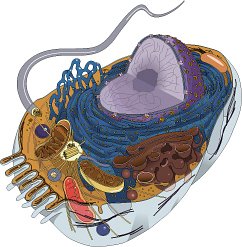Lysosome
|
|
The most important enzymes in lysosomes are:
- Lipase, which digests lipids,
- Carbohydrates, which digest carbohydrates (e.g., sugars),
- Proteases, which digest proteins,
- Nucleases, which digest nucleic acids.
The lysosomes are used for the digestion of macromolecules from phagocytosis (ingestion of cells), from the cell's own recycling process (where old components such as worn out mitochondria are continuously destroyed and replaced by new ones, and receptor proteins are recycled), and for autophagic cell death, a form of programmed self-destruction of the cell, which means that the cell is digesting itself. Other functions include digesting foreign bacteria that invade a cell and helping repair damage to the plasma membrane by serving as a membrane patch, sealing the wound.
There are a number of illnesses that are caused by the malfunction of the lysosomes or one of their digestive proteins, e.g., Tay-Sachs disease, or Pompe's disease. These are caused by a defective or missing digestive protein, which leads to the accumulation of substrates within the cell, resulting in impaired cell metabolism. Broadly, these can be classified as mucopolysaccharidoses, GM2 gangliosidoses, lipid storage disorders, glycoproteinoses, mucolipidoses, or leukodystrophies.
The constant pH of 4.8 is maintained by hydrogen proton pumps and Cl- ion channels.
| Organelles of the cell |
|---|
| Chloroplast | Mitochondrion | Centriole | Endoplasmic reticulum | Golgi apparatus | Lysosome | Myofibril | Nucleus | Peroxisome | Ribosome | Vacuole | Vesicle |

